Deteriorating civic space
In its statement, ISHR highlighted significant concerns about the state of human rights defenders (HRDs) and civic space in Africa. It reviewed trends in Angola and Zimbabwe, among others, consisting of adopting laws which curb the ability of defenders to exercise their activities freely. Indeed, in July 2023, Angola’s National Assembly passed a bill approving the status of Non-Governmental Organisations, whose provisions considerably limit the enjoyment of fundamental freedoms and restrict civic and democratic space.
Furthermore, in June 2023, the Zimbabwean government published new amendments to its draft Private Voluntary Organisations Act, considerably modifying the original text. The adoption of this amended text could lead to the repression and criminalisation of civil society work.
‘In addition, we urge your mandate to take proactive measures to counter the growing trend towards restrictive laws against defenders across Africa. Protecting and promoting the rights of human rights defenders is essential for the respect of international human rights standards in Africa, and we request the Commission’s continued support in this endeavour’, added Etong Kame.
To conclude, ISHR reminded the Special Rapporteur that following its 2019 call for contribution, ISHR submitted a report that presented a disturbing pattern of intimidation and reprisals in several African countries against civil society collaborating with African human rights mechanisms and called on the Special Rapporteur to publish his first report on reprisals.
The Special Rapporteur’s efforts
The Special Rapporteur, Commissioner Remy Ngoy Lumbu acknowledged, in his Intersession Report, how acts of reprisals are still rife and multifaceted in Africa.
He announced that ‘a first report on reprisals is being drafted with the technical support of the partners who support us in this area. To this end, the mechanism intends to launch a call for contributions for its first report, which will be published and launched at the April/May session in 2024. The mechanism will contact all States from which it receives allegations of reprisals to give them the opportunity to comment’. This is a welcome development as it will highlight and document the plight of defenders who are victims of reprisals and provide an opportunity for States to respond to such allegations.
Furthermore, the Special Rapporteur echoed ISHR’s concerns about restrictive laws that continue to be adopted on the African continent. ‘The decision adopted in Mali on 21 September 2021 setting out the characteristics, procedures for granting and withdrawing the professional card of human rights defenders is against the spirit of the United Nations Declaration on Human Rights Defenders’, he lamented. He therefore called on States to use the African Commission Guidelines on Freedom of Association and Assembly in Africa to ensure compliance of their legislation, policies and administrative practices with international human rights law.




